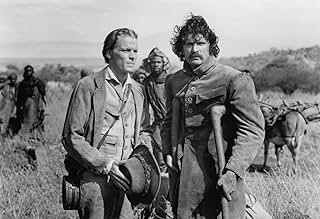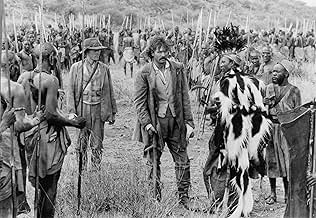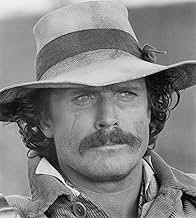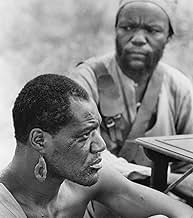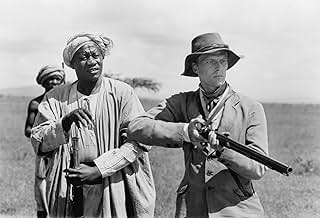IMDb RATING
7.1/10
4.6K
YOUR RATING
The legendary true-story of Capt. Richard Francis Burton and Lt. John Hanning Speke's tumultuous expedition to find the source of the Nile river.The legendary true-story of Capt. Richard Francis Burton and Lt. John Hanning Speke's tumultuous expedition to find the source of the Nile river.The legendary true-story of Capt. Richard Francis Burton and Lt. John Hanning Speke's tumultuous expedition to find the source of the Nile river.
- Awards
- 1 win total
Featured reviews
"Mountains of the Moon" is the kind of epic that seems to need a director like Bob Rafelson. I hoped this would be his "Lawrence of Arabia," but something goes amiss in the construction of the drama which Rafelson coauthored. For instance, we learn more about the two protagonists in two single lines than the 40 minutes that begin the film: Speke: (asking permission to organize some specific details of setting up an expedition in to the interior of Africa) responds, "I already have"; and for Burton: (a voice over) "Dear Isabelle
." The meandering, surprisingly cruel, first 40 minutes of the film become irrelevant.
Speke and Burton's search to find the source of the Nile is great material for a film. The scenery alone would lead any director to jump at the chance, but as so often occurs with films about Africa, the Continent overpowers the human drama. Rafelson is a master of human intimacy, and this story of two men's friendship which turns to rivalry is badly mangled by the screenplay. Burton's life alone is a huge trove for the subject of a film, and Rafelson seems to never grip the nature of these men, the essence of the story nor how to tell it.
Yet, the film is worth spending time with only to lavish in the effort of these two men and perhaps the last time when "discovery" meant a places on a map.
Speke and Burton's search to find the source of the Nile is great material for a film. The scenery alone would lead any director to jump at the chance, but as so often occurs with films about Africa, the Continent overpowers the human drama. Rafelson is a master of human intimacy, and this story of two men's friendship which turns to rivalry is badly mangled by the screenplay. Burton's life alone is a huge trove for the subject of a film, and Rafelson seems to never grip the nature of these men, the essence of the story nor how to tell it.
Yet, the film is worth spending time with only to lavish in the effort of these two men and perhaps the last time when "discovery" meant a places on a map.
It's 1854. Entitled aristocratic John Hanning Speke (Iain Glen) arrives on the East African Coast on leave from the Army. He recruits Captain Richard Francis Burton (Patrick Bergin) on a journey to find the source of the Nile. Burton is an expert on natives. They call the location Mountains of the Moon. The expedition is soon attacked by a local tribe. Burton and Speke barely escape. Back in England, Burton is organizing a new expedition with the Royal Geographical Society. Isabel Arundell is a well-read spinster and completely taken with Burton. With Speke at his side, Burton returns to Africa to lead a grand expedition following Arab slave trade routes into the interior. They rescue escaped slave Mabruki (Delroy Lindo) from the lions.
It is an epic Victorian adventure. It's too bad that few saw it and it continues that few people knows about it. It is grand and a character study. The black Africans are not cartoon characters. One can compare it to Lawrence of Arabia. The cinematography is not quite as great but the story is every bit as compelling. This is an old fashion epic that is being made less and less. There is so much in this story. Surprisingly, the last half hour takes place in England. Changing tone from tense adventure in Africa to Academic back-fighting in London can be tough but the movie never stops being interesting.
It is an epic Victorian adventure. It's too bad that few saw it and it continues that few people knows about it. It is grand and a character study. The black Africans are not cartoon characters. One can compare it to Lawrence of Arabia. The cinematography is not quite as great but the story is every bit as compelling. This is an old fashion epic that is being made less and less. There is so much in this story. Surprisingly, the last half hour takes place in England. Changing tone from tense adventure in Africa to Academic back-fighting in London can be tough but the movie never stops being interesting.
In the Nineteenth Century, the British writer, geographer and explorer Captain Richard Francis Burton (Patrick Bergin) meets the Lieutenant John Hanning Speke (Iain Glen) during a dangerous journey in Africa and after being saved by Speke, they become friends. Soon they team-up to seek the source of the Nile River sponsored by the Royal Geographic Society. Meanwhile Burton meets his fan Isabel Arundell (Fiona Shaw) and they get married to each other. Burton and Speke travel for many months through Africa where they face brutal tribes, diseases, hunger and many other dangers together. Speke finds a lake that he believes it is the source of Nile River but Burton disagrees and believes they need more scientific research to be sure. When they separately return to London, the ambitious publisher Larry Oliphant (Richard E. Grant) stirs up a quarrel between the two friends and Speke travels alone to Africa trying to prove his findings. Will their friendship end?
"Mountains of the Moon" is a fascinating adventure with a story of friendship based on a historic event, the journey of Captain Richard Francis Burton and Lieutenant John Hanning Speke to the African Great Lakes. The plot may be not accurate but the film is engaging and the landscapes are breathtaking. The viewer does not feel the 136 minutes running time. My vote is eight.
Title (Brazil): "Montanhas da Lua" ("Mountains of the Moon")
"Mountains of the Moon" is a fascinating adventure with a story of friendship based on a historic event, the journey of Captain Richard Francis Burton and Lieutenant John Hanning Speke to the African Great Lakes. The plot may be not accurate but the film is engaging and the landscapes are breathtaking. The viewer does not feel the 136 minutes running time. My vote is eight.
Title (Brazil): "Montanhas da Lua" ("Mountains of the Moon")
A great story, beautifully filmed and acted about two Victorian era explorers. Irish-born Sir Richard Francis Burton, one of the greatest explorers in history, is in search of knowledge. English-born dilletante John Hanning Speke joins Burton's quest in search of glory. Together they search for the answer to one of the most elusive geographical questions of their time - what is the Nile's source? The film accurately shows how the Royal Geographical Society and other outside interests played Burton and Speke against each other for their own gain.
The film's tagline really says it all: "Two strangers made friends by a savage world. Two friends made enemies by a civilized world."
The film's tagline really says it all: "Two strangers made friends by a savage world. Two friends made enemies by a civilized world."
This is an excellent film, and it's unfortunate that it wasn't more widely seen. I wish I would've caught it in the theater, as I'm sure it would be magnificent there.
In it, you're going to see some of the most painfully memorable scenes in cinema (that I refuse to give away), and an epic story that is most remarkably, wholly true.
I loved Raiders of the Lost Ark, and before "meeting" Sir Richard Francis Burton, thought characters of Indy's ilk were simply figments of Steven Spielberg's imagination. However, with study you will find that Burton's experience (and that well beyond this expedition) makes him one of the most enigmatic, interesting people to have ever walked the face of the earth. As they say, truth is stranger than fiction.
Slow, smart, challenging, beautiful. And highly recommended viewing.
In it, you're going to see some of the most painfully memorable scenes in cinema (that I refuse to give away), and an epic story that is most remarkably, wholly true.
I loved Raiders of the Lost Ark, and before "meeting" Sir Richard Francis Burton, thought characters of Indy's ilk were simply figments of Steven Spielberg's imagination. However, with study you will find that Burton's experience (and that well beyond this expedition) makes him one of the most enigmatic, interesting people to have ever walked the face of the earth. As they say, truth is stranger than fiction.
Slow, smart, challenging, beautiful. And highly recommended viewing.
Did you know
- TriviaThe spear through Burton's face was an actual event, although the scar as depicted was wrong. The spear split his palate, causing a serious internal fracture of the jaw. It also came close to severing his tongue and it knocked out a half-dozen teeth, as well. The fact that he could survive such an extreme injury was near miraculous.
- GoofsIn an scene set in 1854, Isabel is looking at a copy of "The Perfumed Garden" translated by Burton. Burton did not publish this translation until 1886. While Burton's translation was published in 1886, the original was written between 1410 and 1434. (Burton's unexpurgated translation, to be called "The Scented Garden", was still only in manuscript form when he died. Isabel burned it, believing that would help save his soul from damnation.)
- Quotes
Arab chief in Cairo: In this wilderness you will find only Allah's terrible whimsy.
- Crazy creditsThis motion picture's opening title card reads: "East African Coast 1854".
- How long is Mountains of the Moon?Powered by Alexa
Details
Box office
- Budget
- $19,000,000 (estimated)
- Gross US & Canada
- $4,011,793
- Opening weekend US & Canada
- $66,683
- Feb 25, 1990
- Gross worldwide
- $4,011,793
- Runtime
- 2h 16m(136 min)
- Color
- Aspect ratio
- 1.85 : 1
Contribute to this page
Suggest an edit or add missing content




